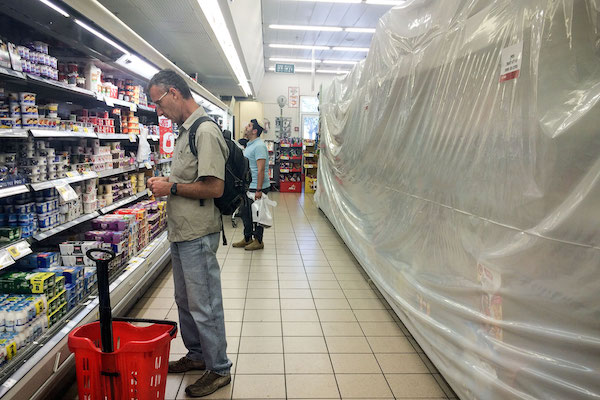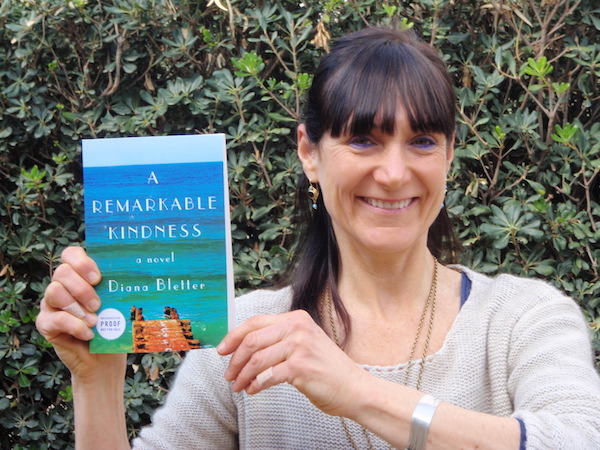A Passover Letter from Israel: Quinoa Okay!
- Category: On Our Radar
- Published: Sunday, 09 April 2017 17:39
- Diana Bletter
 The big news in Israel this spring—besides the terrible mess in Syria—is that quinoa is officially kosher for Passover. And while Israelis do what they can to swerve around civil laws, they take Passover laws with the utmost seriousness.
The big news in Israel this spring—besides the terrible mess in Syria—is that quinoa is officially kosher for Passover. And while Israelis do what they can to swerve around civil laws, they take Passover laws with the utmost seriousness.
A few years ago, when our six kids ate only cereal for breakfast, I didn't plan the rationing right (just kidding) and ran out a few days before Passover began. I went to the local supermarket hoping to buy a box to tide the kids over, and found that the entire cereal aisle had been cordoned off because it contained forbidden chametz, unleavened products. Suddenly, I realized, Cheerios were contraband. So I did what any normal Jewish mother would do, sneaking under the DO NOT CROSS tape, climbing on a shelf, and wresting a box of Captain Crunch from behind the paper barricade. Some of my friends even drive to neighboring Arab villages during Passover to buy pita bread that they'll never find in the local grocery store.
What is chametz, you ask. It comes from one of the five major grains: barley, oats, rye, spelt or wheat, that has come in contact with water for more than eighteen minutes. Jews from Eastern European countries, known as Ashkenazi, also abstain from eating rice, corn and peanuts during Passover. Sephardic Jews who came from Spain, North African countries and Ethiopia, eat these forbidden goodies.
Jews don't eat chametz during Passover week to celebrate our exodus from Egypt, where we were slaves. With the Egyptians chasing us, we didn't have time to bake crusty loaves, only unleavened bread, or matzoth, which tastes like cardboard and lands like cement. But matzoth has come to represent this pivotal time in Jewish history, when the Jews became a united people, a nation.
Women in Israel go nuts scrubbing the house before Passover. They take spring cleaning to a whole new level. Houses are turned upside down and women go after every last particle of Saharan dust and every last bread crumb with single-minded fervor. I was sitting outside talking to my husband, Jonny, on Friday afternoon when my daughter, Amalia, came over with her boyfriend who asked me how my Passover preparations were going. Then he did a double-take.
"You're just. . . just. . ." he stammered. "Just. . . sitting around, talking, when Passover is only three days away?!?"
It was much to my surprise that Jonny, an olive-skinned guy from Passaic, announced this year that since his family originally fled Spain during the Inquisition, he is Sephardic. Which means that in our house, we can indulge in rice, corn and Bamba, Israel's number one peanut snack. (Bamba looks like pale Cheese Doodles and tastes like peanut butter.) Not only that, but we are forgoing the usual matzoth ball soup, gefilte fish, and brisket, and ordering sushi from a guy living on a kibbutz down the road who makes it to order. You can find delicious falafel, zaatar and hummus in our area, but good sushi is expensive, and hard to score, and we consider it a special treat. So we'll ask the Four Questions at our Seder, and then nibble on raw fish and vegetable treats for all our vegan offspring.
I moved from New York to this small beach village in northern Israel in 1991 because of my idealistic hopes to work for peace and my strong Jewish convictions, and there's one thing I've learned as the world seems to revolve more and more around people whose religious beliefs lead them to murder, I can continue to do what I can—and also try to take religion a little less seriously.
 National Jewish Book Award nominee Diana Bletter is the author of A Remarkable Kindness. Her work has appeared in The New York Times, The Wall Street Journal, and other publications.
National Jewish Book Award nominee Diana Bletter is the author of A Remarkable Kindness. Her work has appeared in The New York Times, The Wall Street Journal, and other publications.






